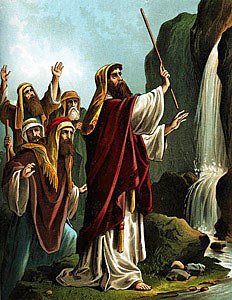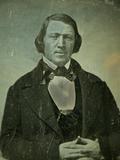The Moving Rock in the Wilderness

Exodus 17 and Numbers 20 contain two accounts of Moses acquiring water from a rock. Paul later attributes this to Jesus Christ as the rock that supplies this water.
How did the Israelites deal with the logistics of traveling in the wilderness for forty years with all of those people? With 2 million people to feed, water, clothe, bathe (not to mention waste management, don’t get me started. I served on the board for the local sewer district a number of years, and this is a big project, believe me), and care for, how did Moses do it?
There are some interesting issues at work in this narrative. I believe that one of the issues has to do with sources, in other words, there is strong evidence to conclude that these stories of Moses striking a rock come from different sources. These individual sources wrote these accounts at different times. These sources were then stitched together to form the first five books of Moses. Without going into details any further in this short post, it is worth noting, and I will probably write more about this aspect of the text later, but we need to at least acknowledge that this is going on.
Peter Enns, author of The Bible Tells Me So, shares an experience when he first learned of the “movable rock” narrative in the Pentateuch. Enns writes:
One day in class, my professor James Kugel was lecturing on the creative ways that Second Temple Jewish interpreters handled episodes like “water from a rock.” The curious detail in the Old Testament is that the incident happened twice: once at the beginning of the wilderness period (Exodus 17) and again toward the end of the 40-year period (Numbers 20).
This curious fact led some Jewish interpreters to conclude that the “two” rocks were actually one and the same, hence, one rock accompanied the Israelites on their 40-year journey. 1
James Kugel, in his work How to Read the Bible, writes:
At first glance this might simple appear to be a second occurrence of the same sort of miracle; again there was a rock handy, and again Moses was ordered to extract water from it. If a similar miracle occurred twice, that was apparently because the same set of circumstances (the people complaining about the lack of water) had come up again. But if so, why did Scripture now say that “these are the waters of Meribah”; weren’t the waters of Meribah back in Rephidim, many miles to he west? Interpreters noticed another thing as well: from the time when Moses had struck the rock at Rephidim, in the book of Exodus, to this moment in Kadesh, in the book of Numbers, there had not been a word about the Israelites lacking water. At the same time, Scripture did not report on their reaching any new oasis or digging any wells.
The more interpreters considered the matter, the more what must as first have seemed an unlikely explanation now recommended itself. If, in the time that separated the incidents at Rephididm and Kadesh, the Israelites had not lacked for water – neither they nor their considerable livestock- it must have been that they continued to have their needs supplied by that very same rock that Moses had struck. This was their source of drinking water for a full forty years. And if Scripture said that the “waters of Meribah,” which had been located at Rephidim, were now found at Kadesh, that must mean that the rock that provided those waters had somehow moved (or been transported) from Rephidim to their present location, so as to be constantly in proximity of the Israelites and their flocks.
Thus was born the tradition of the traveling rock that followed Israel in its desert wanderings for forty years. 2 Indeed, we do have some extant references to this very idea from ancient interpreters of scripture that lived in the days of the New Testament’s authors 3 who seem to indicate this view of a “traveling rock” that went with the Israelites in the wilderness narrative:
“Now He led His people out into the wilderness; for forty years He rained down for them bread from heaven, and brought quail to them from the sea, and brought forth a well of water to follow them.
And it [the water] followed them in the wilderness forty years and went up to the mountain with them and went down into the plains.” (Pseudo-Philo, Book of Biblical Antiquities 10:7; 11:15)
It seems that the Apostle Paul is picking up on these ideas, and like a Second Temple Jew living in his time period, used these stories to then contextualize them, to give them meaning in his world once he had converted to the Savior Jesus Christ. He used this idea of a movable rock, applying it to Jesus Christ. Jesus is our rock, our water, and just like water, our source of life. Paul tells the Saints in Corinth:
Moreover, brethren, I would not that ye should be ignorant, how that all our fathers were under the cloud, and all passed through the sea; And were all baptized unto Moses in the cloud and in the sea; And did all eat the same spiritual meat; And did all drink the same spiritual drink: for they drank of that spiritual Rock that followed them: and that Rock was Christ. (1 Corinthians 10:1-4, emphasis added)
Another source from antiquity relates the following:
And so, the well that was with Israel in the desert was like a rock the size of a large container, gushing upwards as if from a narrow-neck flask, going up with them to the mountains and going down with them to the valleys. (Tosefta Sukkah 3:11 – a composition of the oral law from the late 2nd century)
So what does all of this mean? To me, it means that the authors of scripture were living in time, and they cannot be separated from these times in which they lived and breathed. They were in a culture that had beliefs and values that meant something. God used these individuals to put together his word, and allowed these people to then clothe his revelation to them in their fallen language, in their culture. God does speak to man, but he speaks to man according to his (man’s) language (D&C 1:24). Another way of saying this is that God accommodates his revealed law to the cultural and ideological perspectives of those of the Ancient Near East, or whatever culture he is working with at the time. We see accommodation in the words of Book of Mormon prophets as well as Biblical authors. 4

Brigham Young
1801-1877
Indeed, as Brigham Young said, “revelations of God contain correct doctrine and principles, so far as they go; but it is impossible for the poor, weak, low, groveling, sinful inhabitants of the earth to receive a revelation from the Almighty in all its perfections. He has to speak to us in a manner to meet the extent of our capacities.” In fact, Brigham said he did not believe there was a single revelation, among the many God has given to the Church, that is perfect in its fullness.” 5 This, to me, is accommodation. God speaks to us according to our understanding, whether we are discussing water from a rock or Jesus Christ himself.
Notes
- Share





